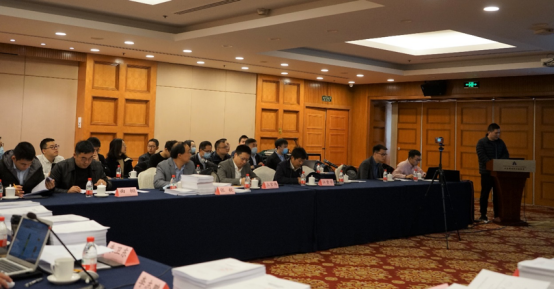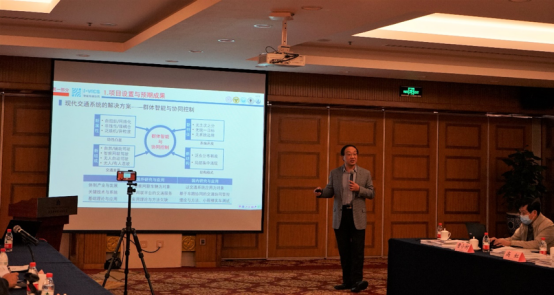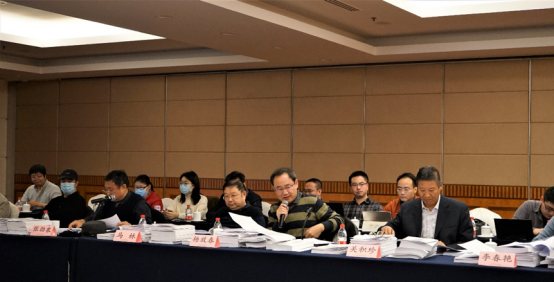On November 25, 2020, in Beijing, experts invited by the key special projects management office focusing on "integrated transportation and intelligent traffic" from the Ministry of Science and Technology's High-tech Research and Development Center, completed the mid-term review of the "theory and experimental verification of intelligent control for vehicle group in cooperative road environment" project led by Tsinghua University. This project is a part of the national key research and development program (NKP) focusing on "integrated transportation and intelligent traffic" and is led by Tsinghua University and jointly undertaken by 18 institutions, including Southeast University, Tongji University, Beijing Jiaotong University and Chang'an University, with an implementation period of three years.
More than 40 personnel attended the meeting, including Zhu Weidong (Director of Energy and Transportation Department of High-tech Research and Development Center of Ministry of Science and Technology), Li Zhipeng and Li Tuo (project supervisors), Yang Fangchun (the member of the mid-term review team and also the former Executive Vice President of Chinese Association for Artificial Intelligence), Guan Jizhen (Vice President of China Intelligent Transportation Systems Association), Ma Lin (Deputy Director of the Urban Transportation Engineering Technology Center of the Ministry of Housing and Urban-Rural Development), Zhang Jinquan (Director of Highway Research Institute of the Ministry of Transport), Li Chunyan (Deputy Director of the Comprehensive Research Institute of Beijing Transportation Development Research Institute) and Gao Hong and Cao Xiaoke (financial experts), as well as representatives from all participating units.

Mid-term project review meeting
The mid-term project review was presided over by Professor Yang Fangchun and consisted of four parts, namely, a mid-term project implementation report, inquiries from experts in the review team, a mid-term review opinion discussion and a mid-term review summary. The project leader, Professor Zhang Yi, from the Automation Department of Tsinghua University, reported on the mid-term status of the project's implementation in detail, from the aspects of the overall progress, completion status of the assessment indicators, important progress and achievements, personnel input and use of funds, organization and management, and subsequent plans. The project review expert team made inquiries according to the project launch and project charter, and went through materials on the mid-term review. The project team addressed the inquires from the experts and engaged in a comprehensive discussion with them.

Professor Zhang Yi, the project leader, reported on the mid-term status of the implementation of the project
After the panel’s live inquiries and discussion, the experts at the meeting unanimously agreed that significant research results have been achieved in the project in various aspects such as the decision-making mechanism and collaborative control theory of complex mixed groups in the cooperative road environment, and the testing and verification technology system for intelligent cooperative control of heterogeneous traffic entities in a connected network. Meanwhile, the preliminary construction of a multi-modal and reliable interactive test verification system, real-time simulation test platform for the coordinated behavior of large-scale heterogeneous traffic subjects and integrated verification test environment for cooperative control of vehicle group in virtual-real scenes, is completed. Also the verification platform for vehicle group intelligent decision-making and collaborative control under typical scenarios is developed. The mid-term milestones and expected objectives of the project have been completed, and the project passed the mid-term review. The panel of experts also provided opinions and suggestions on the focus on project results, project management and the usage of funds.

Inquiry of experts from the mid-term review panel
Director Zhu Weidong summarized the mid-term review meeting and emphasized the need for the project team to enhance the consolidation of important achievements and highlight innovative research outcomes. Professor Zhang Yi, the principal investigator, thanked the Special Management Office and the panel of experts for their affirmation and valuable suggestions, on behalf of the team. He also said that subsequent research would be carried out according to the guidance and suggestion of the experts.
The mid-term review meeting not only affirmed the research results of the project team achieved in the early stages, but also provided further clarification on the focus areas of the team's work in the later stages. This ensures the future development of research, enhancement of significant achievements, and successful completion of the project.

